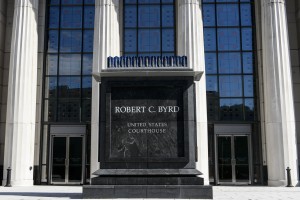Notes from the Blankenship jury
November 24, 2015 by Ken Ward Jr.
Photo by Sam Owens
Jurors in the Don Blankenship criminal case begin their deliberations shortly before 4 p.m. on Tuesday, Nov. 17. They have deliberated all day each weekday since then. Here’s a list of the substantive notes that jurors have sent to U.S. District Judge Irene Berger and the judge’s response.
— Wednesday, Nov. 18, at about 4:40 p.m.
Jury note: “Can we listen to the CDs?” [Referring to recordings of Don Blankenship’s telephone calls, played during trial by prosecutors]
Judge’s response: “We will provide a means for you to listen to the CDs.”
— Thursday, Nov. 19, 2015, at about 11:45 a.m.
Note: “How long do we deliberate? We cannot agree.”
Judge’s response: “I would simply say to you that given the length of this trial and the number of witnesses that you heard and the amount of time that you have deliberated, I am going to order that you continue your deliberations in this case.”
— Friday, Nov. 20, 2015, at about 2:40 p.m.
Note: “Some of the jurors want clarification on the statement in question in Count Two and Count Three of the indictment, “We do not condone any violation of MSHA regulations,” and “We strive to be in compliance with all regulations at all times,” specifically the words “condone” and “strive.””
Judge’s response: “I instruct you that I have given to you or provided to you all of the legal instructions that I can properly give to you with respect to Counts Two and Three of the indictment.”
UPDATED — Tuesday, Dec. 1, at about 11:50 a.m.
Note: “You honor, the jury is still deadlocked. Do you have any further instructions as to what we should do? Thank you.”
Judge’s response:
“Ladies and gentlemen, you have informed me of your inability to reach a verdict in this case. At the outset, the Court wishes you to know that although you have a duty to reach a verdict, if that is not possible, the Court has neither the power nor the desire to compel agreement upon a verdict. The purpose of these remarks is to point out to you the importance and the desirability of reaching a verdict in this case provided, however, that you as individual jurors can do so without surrendering or sacrificing your conscientious scruples or personal convictions. You will recall that upon assuming your duties in this case, each of you took an oath. The oath places upon each of you as individuals the responsibility of arriving at a true verdict upon the basis of your opinion and not merely upon acquiescence in the conclusion of your fellow jurors.
“However, it by no means follows that opinions may not be changed by conference in the jury room. The very object of the jury system is to reach a verdict by a comparison of views and by consideration of the proofs with your fellow jurors. If, after conscientious deliberations, you are only able to reach a verdict concerning some of the counts, you may return a verdict concerning those counts. During your deliberations you should be open-minded and consider the issues with proper deference to and respect for the opinions of each other, and you should not hesitate to re-examine your own views in the light of such discussions. If at this point you find yourself in the minority, please listen and carefully consider the views of the majority. If you find yourself in the majority, please listen and carefully consider the views of the minority. You should consider also that this case must at some time be terminated; that you are selected in the same manner and from the same source from which any future jury must be selected; that there’s no reason to suppose that the case will ever be submitted to 12 persons more intelligent, more impartial, or more competent to decide it, or that more or clearer evidence will ever be produced on one side or the other.
“You may retire now, taking as much time as is necessaryfor further deliberations upon the issues submitted to you for determination in light of all of the Court’s instructions.”
UPDATED: Wednesday, Dec. 2:
Note 1, 1:30 p.m.: “Your honor, one of the jurors, Bill Rose, has been sick all day with sore throat, fever and chills. Thank you.”
Note 2, 2:30 p.m.: “Your honor, may we take a 20-minute break at 3:00?”
Judge’s response, about 3:15 p.m.:
“Good afternoon, ladies and gentlemen. I have received your note when you asked to take a 20-minute break at 3:00 and to advise me that Mr. Rose is too ill to participate. So I’m going to release you for the day, Mr. Rose, so that you can attend to your medical issues … Mr. Rose, if you continue to feel ill, you can contact our office if need be. Otherwise, I will see you all tomorrow morning at 9:30.”

 Subscribe to the Coal Tattoo
Subscribe to the Coal Tattoo
